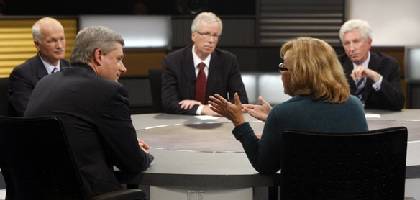
“Debate is angular, conversation circular and radiant of the underlying unity.”
–Amos Bronson Alcott
Like many of you in the space community, I’ve been following the twists and turns over the last few months in defining a human spaceflight policy for NASA. At the NewSpace 2010 Space Conference in Silicon Valley in late July, participants were speaking enthusiastically about the proposed space policy changes relative to commercial involvement contained in the Obama administration’s 2011 budget for NASA, then bemoaning the rollbacks of varying degrees proposed in NASA authorization bills winding their way through Congress. What I found interesting were the choices in words by select participants for describing the involvement of commercial enterprises in ferrying crews to and from low Earth orbit. Specifically, some chose the word “debate” and others chose “conversation” when talking about how to define roles for the proposed commercial carriers and where a Government-provided system fits into the future of human spaceflight. I’m very curious about the choice of words between debate and conversation. Are they deliberate choices? What does the choice of words convey relative to the intent of the speaker, and what’s the difference?
Let’s look at debate and conversation as words.
Debate. When I see this word, I think of “high school debate team.” It brings a picture to mind of a formal setting pitting two or more sides arguing for a position, with the outcome that there is a “winner” and one or more “losers”. In fact, Webster’s dictionary defines debate as “a contention by words or arguments: as (1) the formal discussion of a motion before a deliberative body according to the rules of parliamentary procedure; or (2) a regulated discussion of a proposition between two matched sides.” The origin of the root of debate, batre, means literally “to beat”, as with a stick.
I imagine there are a few in the NewSpace community for whom the visualization of beating someone with a stick is exactly the intended image! Whether it is out of frustration over objectives or getting a seat at the table, the idea of gathering together all the stakeholders and have a once-and-for-all debate on commercial crew transport versus government-provided transportation is probably what some have in mind. (“Let’s debate the merits and decide between the two.”) In such a scenario, there is a winner, and there is a loser. In leadership circles, we call this a “win-lose” proposition.
I see a similarity between a debate and one of the six decision-making processes – majority voting. This approach can be used when decisions must be made quickly between one of two choices, and a division in the stakeholders is an acceptable outcome.
For me, it begs a series of questions. Do we have only two choices: commercial versus Government-supplied? What about something else? Is a division between the commercial providers and the Government an acceptable outcome?
Conversation. When I see this word, I think of a casual setting involving people sharing ideas and talking about a topic of interest. Webster’s dictionary defines conversation as “(1) an oral exchange of sentiments, observations, opinions, or ideas; or (2) an informal discussion of an issue by representatives of governments, institutions, or groups.” The origin of the root of conversation, conversari, means “to associate with.”
A different picture comes to mind for me here. The centerpiece is sharing viewpoints and finding common ground that leads to an outcome that is the best of all the ideas brought forth. There is no “us” versus “them.” Instead, there is “all of us” associating together — the “win-win” proposition.
As in the case of a debate, I see a similarity between a conversation and a different decision-making process – consensus. Here, the method is to gather the stakeholders to seek clear understanding of the situation or problem to be decided, analyzing all of the relevant facts together, and then jointly developing solutions that represent the whole team’s best thinking about the optimal decision.
For me, the central question is this: what new ideas and approaches that go beyond the either-or paradigm might there be?
And so….
From a leadership standpoint, I don’t see a clear benefit for human spaceflight by having a debate. (Who is debating whom? Who is the judge?) My leadership instincts tell me that an either-or solution at this time is a recipe for disaster. For instance, the commercial solution for crew transportation to low Earth orbit is unproven with regards to cost, reliability and safety, and Government-provided systems may not be sustainable in the long run when considering the likely budgetary constraints that NASA will face in the years to come. Limiting ourselves to picking one or the other today at the exclusion of the other could have irrecoverable impacts tomorrow.
A conversation that combines the best of both – Government and commercial – is a reasonable starting step towards a long-term sustainable solution. I’m talking about a form of a public-private partnership. A conversation of collaboration would unite the stakeholders and build buy-in and high commitment to the outcome on the part of all stakeholders – NASA, Congress, the commercial sector, advocacy and oversight groups, and the White House. It will take time. Yet a conversation that encompasses all factors that influence the solution – technical approaches, seeking a fiscal balance between risk and responsibility, workforce skills and abilities, and political considerations – would provide the optimal solution for a sustainable approach to human spaceflight.
What do you think?

You must be logged in to post a comment.